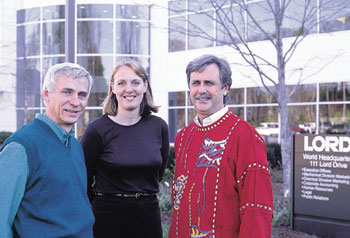

A publication of the Graduate School, University of North Carolina at Chapel Hill
Archives Spring 2000
Home | Back issues | About us | Email your feedback | The Graduate School | UNC-Chapel Hill | Make a gift
Mutual Interests
Part I: Lord Corporation and Carolina Chemistry meld basic science and technology
When Hugh Lord, an attorney and inventor from Erie, Pennsylvania, formed Lord Manufacturing Company in 1924 with six employees, he had no idea it would develop into what it is today--a global technology firm. Surprisingly, Carolina graduate studies have played an important role in Lord Corporation's development into a major supplier of specialty adhesives and coatings and a manufacturer of vibration and motion control devices for aerospace and general industry.
Much of Lord Corporation’s growth has occurred in the past twenty years after their central headquarters moved from Erie to Cary. As Dr. Dick Ambrose, Director of Chemical Technologies at Lord, explains, the primary motivation for moving to North Carolina reflects one of the major sources of the economic explosion in the Triangle: "One of the main reasons we relocated here was because of the three major research universities in close proximity. This was pretty fertile ground for a high-tech company."
Dick explains that one of the first goals after moving to the Triangle was to establish a connection between the Lord Corporation and Carolina’s Chemistry Department: "We wanted to interact with Carolina’s graduate students. Specifically, we wanted access to the Chemistry Department’s equipment and to the knowledge that their research produces." To do this, Dick contacted Dr. Royce Murray, a professor in the Chemistry Department at Carolina, who remains Lord Corporation’s primary liaison today.
Over the years, Dr. Murray’s relationship with the Lord Corporation has developed into a consultantship, in which Dr. Murray provides technical advice to the Lord Corporation. In exchange for his services, Lord Corporation funds Dr. Murray’s lab and some of his graduate students. This creates a valuable opportunity for both Lord Corporation and UNC.
 |
| Photo by Will Owens |
| Dick Ambrose, Dori Canelas and David Lewis at Lord Corporation's international headquarters in Cary, N.C. |
Royce describes the services that he and his graduate students offer Lord: "We provide them with technical assistance. Their people have come to my lab to learn how to do certain kinds of experiments and to be introduced to certain kinds of equipment. My students help with that as a kind of good-will, good-neighbor policy for someone in the University and the Triangle." For Lord Corporation, this "good neighbor" policy has proven extremely valuable. Dick Ambrose elaborates on the value of research institutions like Carolina to corporations like Lord: "In interacting with Chemistry faculty and students, we’ve had countless beneficial conversations. We’ve gained a lot of knowledge. We’ve hired Carolina students who now work for us full-time. We’ve benefited tremendously."
Just as Dick knows that Lord Corporation has benefited from Carolina, he believes that Carolina equally has benefited from its relationship with Lord. "Certainly we have provided some funds, which are always needed. But I’d like to think that they’ve gotten a better idea how industrial people think and what they’re interested in. They get an important and essential industrial perspective. I’d like to think some of that exchange of information has taken place with Lord Corporation."
Royce Murray agrees that the relationship is mutually beneficial. He stresses that not only do corporations serve as employers for graduates, but they also "help the science we create be used. There’s a symbiotic aspect of it in that universities have long looked to industry to help support their programs. We share a mutual interest. A great deal of the basic knowledge in the sciences has come out of universities. However, corporations like Lord often know more about the latest technological developments than we do."
Although Royce is grateful for the Lord Corporation’s assistance, he is quick to emphasize that he has no obligation to work on specific things for Lord, nor are his graduate students compelled in any way to work for Lord after they graduate. As he puts it, "This is simply a good-will agreement on both sides."
© 2002, The Graduate School, The University of
North Carolina at Chapel Hill
All text and images are property of the Graduate School
at the University of North Carolina-Chapel Hill. Contact Sandra Hoeflich
at shoeflic@email.unc.edu
to request permission for reproduction.